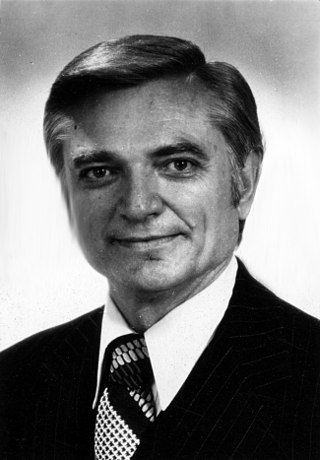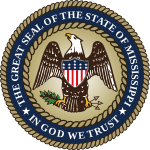
Ross Robert Barnett was the 53rd governor of Mississippi from 1960 to 1964. He was a Southern Democrat who supported racial segregation.

Charles Clifton Finch was an American politician who served as the 57th governor of Mississippi from 1976 to 1980.

William Lowe Waller Sr. was an American politician and attorney. A Democrat, Waller served as the 56th governor of Mississippi from 1972 to 1976. Born near Oxford, Mississippi to a farming family, Waller went to law school and in 1950 established a law practice in Jackson. Nine years later, he was elected District Attorney of Hinds County, Mississippi. Waller attempted to reform the position and provoked the ire of local law enforcement for aggressively prosecuting several cases. In 1964, he twice prosecuted Byron De La Beckwith for the murder of civil rights activist Medgar Evers, with both trials resulting in deadlocked juries. In 1967, he launched an unsuccessful campaign for governor, finishing fifth in the Democratic primary.

The 1966 United States Senate elections were elections on November 8, 1966 for the United States Senate which occurred midway through the second term of President Lyndon B. Johnson. The 33 seats of Class 2 were contested in regular elections. Special elections were also held to fill vacancies. With divisions in the Democratic base over the Vietnam War, and with the traditional mid-term advantage of the party not holding the presidency, the Republicans took three Democratic seats, thereby breaking Democrats' 2/3rds supermajority. Despite Republican gains, the balance remained overwhelmingly in favor of the Democrats, who retained a 64–36 majority. Democrats were further reduced to 63-37, following the death of Robert F. Kennedy in June 1968.

Carroll Gartin was an American Democratic politician from Laurel in Jones County in southeastern Mississippi, who served three terms as the 22nd lieutenant governor of his state. He was born in Meridian, in eastern Mississippi.

The 1978 United States Senate election in Mississippi was held on November 5, 1978. Incumbent Democratic U.S. Senator James Eastland decided to retire.

The 1967 Mississippi gubernatorial election took place on November 7, 1967, in order to elect the Governor of Mississippi. Incumbent Democrat Paul B. Johnson Jr. was term-limited, and could not run for reelection to a second term.

The 1963 Mississippi gubernatorial election took place on November 5, 1963, in order to elect the Governor of Mississippi. Incumbent Democrat Ross Barnett was term-limited, and could not run for reelection to a second term.

The 1955 Mississippi gubernatorial election took place on November 8, 1955, in order to elect the Governor of Mississippi. Incumbent Democrat Hugh L. White was term-limited, and could not run for reelection to a second term. As was common at the time, the Democratic candidate ran unopposed in the general election so therefore the Democratic primary was the real contest, and winning the primary was considered tantamount to election.

The 1951 Mississippi gubernatorial election took place on November 6, 1951, in order to elect the Governor of Mississippi. Incumbent Democrat Fielding L. Wright was term-limited, and could not run for reelection to a second full term. As was common at the time, the Democratic candidate ran unopposed in the general election so therefore the Democratic primary was the real contest, and winning the primary was considered tantamount to election.

The 1943 Mississippi gubernatorial election took place on November 2, 1943 to elect the Governor of Mississippi. Incumbent Democrat Paul B. Johnson Sr. was term-limited, and could not run for reelection to a second term. As was common at the time, the Democratic candidate ran unopposed in the general election so therefore the Democratic primary was the real contest, and winning the primary was considered tantamount to election.

The 1939 Mississippi gubernatorial election took place on November 7, 1939, in order to elect the Governor of Mississippi. Incumbent Democrat Hugh L. White was term-limited, and could not run for reelection to a second term. As was common at the time, the Democratic candidate ran unopposed in the general election so therefore the Democratic primary was the real contest, and winning the primary was considered tantamount to election.

The 1935 Mississippi gubernatorial election took place on November 5, 1935, in order to elect the Governor of Mississippi. Incumbent Democrat Martin S. Conner was term-limited, and could not run for reelection to a second term. As was common at the time, the Democratic candidate ran unopposed in the general election so therefore the Democratic primary was the real contest, and winning the primary was considered tantamount to election.

The 1931 Mississippi gubernatorial election took place on November 3, 1931, in order to elect the Governor of Mississippi. Incumbent Democrat Theodore G. Bilbo was term-limited, and could not run for reelection to a second term. As was common at the time, the Democratic candidate ran unopposed in the general election so therefore the Democratic primary was the real contest, and winning the primary was considered tantamount to election.

The 1927 Mississippi gubernatorial election took place on November 8, 1927, in order to elect the Governor of Mississippi. Incumbent Democrat Dennis Murphree, as he had not served a full term, was eligible for and ran for election. As was common at the time, the Democratic candidate ran unopposed in the general election so therefore the Democratic primary was the real contest, and winning the primary was considered tantamount to election.

The 1923 Mississippi gubernatorial election took place on November 6, 1923, in order to elect the Governor of Mississippi. Incumbent Democrat Lee M. Russell was term-limited, and could not run for reelection to a second term. As was common at the time, the Democratic candidate ran unopposed in the general election so therefore the Democratic primary was the real contest, and winning the primary was considered tantamount to election.

The 1903 Mississippi gubernatorial election took place on November 3, 1903, in order to elect the Governor of Mississippi. Incumbent Democrat Andrew H. Longino was term-limited, and could not run for reelection to a second term.

The 1954 United States Senate election in Mississippi was held on November 2, 1954. Incumbent Democratic U.S. Senator James Eastland won re-election to his third term.

The 1966 United States Senate election in Mississippi was held on November 8, 1966.
There were three special elections to the United States Senate in 1941 during the 77th United States Congress.


















